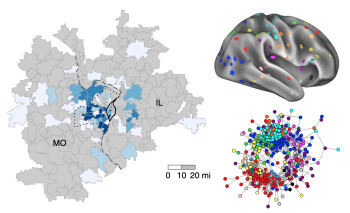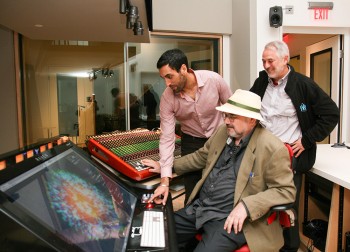Post-doctoral Associate - Neurology
Washington University School of Medicine - 2012

Gagan Wig
Associate Professor - Department of Psychology
Program Head, Cognitive Neuroscience Track, Cognition and Neuroscience PhD
Research Interests: Brain network connectivity, healthy and pathological aging, brain health disparities across the lifespan
Professional Preparation
Post-doctoral Associate - Psychology
Harvard University - 2009
Harvard University - 2009
Ph.D. - Cognitive Neuroscience
Dartmouth College - 2006
Dartmouth College - 2006
B.S. - Behavioral Neuroscience
University of British Columbia - 2001
University of British Columbia - 2001
Research Areas
Research Interests
Dr. Wig's research program uses a combination of structural and functional imaging tools (including fMRI, DTI, and TMS) to understand the organization of large-scale human brain networks and how these networks change over the adult-lifespan. He uses this information to guide studies related to mnemonic and attentional processes, with a particular focus on understanding the sources of individual differences in memory and attention and how they may be modified by aging and disease.Publications
Park, D.C., Hennessee, J.P., Smth, E.T., Chan, M.Y., Dakanali, M. Farrell, M.E., Liu, P., Lu., H, Rofsky, N., Sun, X., Tamminga, C., Moore, W., Rofsky, N., Kennedy, K.M., Rodrigue, K., & Wig, G.S. (2025). The Dallas Lifespan Brain Study: A comprehensive adult lifespan data set of brain and cognitive aging. Nature Scientific Data. 12(1): 1-14. 2025 - publications
Wig, G.S., Chan, M.Y., Nguyen, L.T. (2025). Social determinants of brain health and brain changes across the human lifespan. Encyclopedia of the Human Brain, 2nd Edition. (J. Grafman, Editor). Elsevier. Advanced online publication. 2025 - publications
Petersen, S.E., Seitzman, B.A., Nelson, S.N., Wig, G.S., Gordon, E.M. (2024). Principles of cortical areas and their implications for neuroimaging. Neuron. 112(17): 2837-2853 2024 - publications
Wig, G.S., Klausner, S., Chan, M.Y., Sullins. C., Rayanki, A., Seale, M.A. (2024). Participant diversity is necessary to advance brain aging research. Trends in Cognitive Sciences. 28(2): P92-96. 2024 - publications
Han, L., Chan, M.Y., Agres, P.F., Winter-Nelson, E., Zhang, Z., Wig, G.S. (2024). Measures of resting-state brain network segregation and integration vary in relation to data quantity: Implications for within and between subject comparisons of functional brain network organization. Cerebral Cortex. 34(2): https://doi.org/10.1093/cercor/bhad506. 2024 - publications
Zhang, Z., Chan, M.Y., Han, L., Carreno, C.A., Winter-Nelson, E., Wig, G.S., for the Alzheimer’s Disease Neuroimaging Initiative (ADNI). (2023). Dissociable effects of Alzheimer’s Disease-related cognitive dysfunction and aging on functional brain network segregation. The Journal of Neuroscience. 43(46):7879-7892. 2023 - publications
Chan, M.Y., Han, L., Carreno, C.A., Zhang, Z., Rodriguez, R.M., LaRose, M., Hassenstab, J., Wig, G.S. (2021). Long-term prognosis and educational determinants of brain network decline in older adult individuals. Nature Aging. 1: 1053-1067. 2021 - Publication
Wig, G.S. (2019). Alzheimer’s dilemmas. Issues in Science and Technology. 35(2): 5-8 2019 - Publication
Awards
Understanding Human Cognition Scholar Award - James S. McDonnell Foundation [2006]
Appointments
Head, Cognitive Neuroscience Doctoral Program
Department of Psychology, The University of Texas at Dallas [2025–Present]
Department of Psychology, The University of Texas at Dallas [2025–Present]
Associate Professor
Center for Vital Longevity, The University of Texas at Dallas [2019–Present]
Center for Vital Longevity, The University of Texas at Dallas [2019–Present]
Associate Professor (Adjunct)
Department of Psychiatry, The University of Texas Southwestern Medical Center [2019–Present]
Department of Psychiatry, The University of Texas Southwestern Medical Center [2019–Present]
Assistant Professor
Center for Vital Longevity, The University of Texas at Dallas [2013–2019]
Center for Vital Longevity, The University of Texas at Dallas [2013–2019]
Assistant Professor (Adjunct)
Department of Psychiatry, The University of Texas Southwestern Medical Center [2013–2019]
Department of Psychiatry, The University of Texas Southwestern Medical Center [2013–2019]
News Articles
Researchers Explore Socioeconomic Status’s Link to Dementia
 Scientists from The University of Texas at Dallas School of Behavioral and Brain Sciences (BBS) have demonstrated that a key measure of the health of the aging brain varies in relation to education level, which can indicate the likelihood and severity of later dementia.
Scientists from The University of Texas at Dallas School of Behavioral and Brain Sciences (BBS) have demonstrated that a key measure of the health of the aging brain varies in relation to education level, which can indicate the likelihood and severity of later dementia.Their results, published in Nature Aging on Nov. 11, suggest that environmental factors related to socioeconomic status might accelerate brain aging.
Team Awarded $2.9 Million To Study Socioeconomic Ties to Alzheimer’s
 Researchers at The University of Texas at Dallas’ Center for Vital Longevity (CVL) have received a $2.9 million grant to continue their investigation into links between socioeconomic disadvantage and susceptibility to cognitive decline.
Researchers at The University of Texas at Dallas’ Center for Vital Longevity (CVL) have received a $2.9 million grant to continue their investigation into links between socioeconomic disadvantage and susceptibility to cognitive decline.The National Institute on Aging, part of the National Institutes of Health (NIH), provided funding for the project, led by Dr. Gagan Wig, associate professor of cognition and neuroscience in the School of Behavioral and Brain Sciences. Focusing on middle-aged adults from lower socioeconomic backgrounds, researchers hope to pinpoint structural features of the adult brain that could predict later symptoms of degenerative conditions such as Alzheimer’s disease.
Collaborative Minds Bringing Sounds to Brain Data in Yearlong Project
 Data from functional magnetic resonance imaging (fMRI) have provided eye-popping pictures of the way the brain is wired, and allowed neuroscientists and laypeople alike to view intricate anatomical and functional connections between regions of the brain. But what if a new tool could be applied to MRI and other data, to listen to the way the brain works and how it is forged with connections?
Data from functional magnetic resonance imaging (fMRI) have provided eye-popping pictures of the way the brain is wired, and allowed neuroscientists and laypeople alike to view intricate anatomical and functional connections between regions of the brain. But what if a new tool could be applied to MRI and other data, to listen to the way the brain works and how it is forged with connections?An emerging effort to “sonify” imaging data is taking root at UT Dallas’ Center for Vital Longevity, in the lab of Dr. Gagan Wig. The approach, now funded by the Defense Advanced Research Projects Agency (DARPA), allows data to be represented by sounds from which a trained listener might be able to discern patterns of brain connectivity not readily seen in available visualization strategies.
NATIONAL SCIENCE FOUNDATION TO FUND CENTER RESEARCH ON TARGETED STIMULATION OF BRAIN NETWORKS TO POSSIBLY ENHANCE MEMORY
DALLAS – Sept. 21, 2017 – The National Science Foundation (NSF) has awarded Dr. Gagan Wig nearly $150,000 to investigate whether certain cognitive abilities can be enhanced by directly manipulating a corresponding brain system using non-invasive brain stimulation.Differences in cognitive abilities such as executive function, long-term memory, and language are present not only across different ages but also within groups of seemingly similar people, such as healthy young adults. Researchers consider these differences to reflect differences in the functional specialization of networks in the human brain.